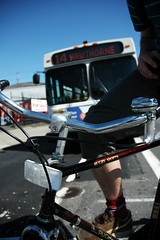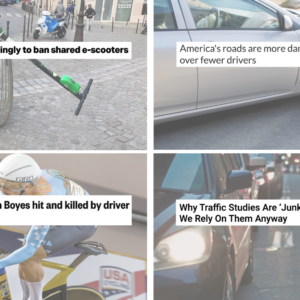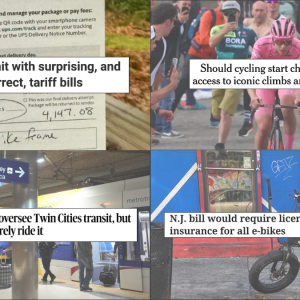TriMet — and therefore transit as we know it in Portland — in trouble. The agency is under pressure to cut its budget, and so far, its seems to be leaning primarily toward service cutbacks and fare increases as the primary way to do it.
Less service and higher prices is the exact opposite direction our transit system should be headed. If that’s the route TriMet takes, they will be helping start a negative spiral of lower ridership that could darken what was once Portland’s very proud and bright transit legacy. Without good transit service, people who can’t afford to own a car and folks who ride bicycles will have one less option for longer trips. It will make Portland a much tougher place to have a low-car existence.
Is there another way forward for TriMet? Absolutely. For more on that, I recommend reading our Q & A with transit activist Jonathan Ostar and the ongoing reporting by Portland Afoot. For now, it’s important that TriMet knows that the community cares about abundant and affordable transit service.
You can help make that impression by attending the open house event tonight:
- TriMet Budget Proposal Open House
Portland Building Room C
1120 SW 5th Ave.
4:30-6:30 p.m.








Thanks for reading.
BikePortland has served this community with independent community journalism since 2005. We rely on subscriptions from readers like you to survive. Your financial support is vital in keeping this valuable resource alive and well.
Please subscribe today to strengthen and expand our work.
Jonathan,
is there a way to follow the insightful comments folks leave in response to your stories without posting oneself, and clicking the little ‘notify me’ box?
When I’ve raised this before, others have chimed in that they too were interested in the answer.
Thanks for your excellent reporting!
Thanks as always for spreading the word about this, Jonathan.
This is definitely a chance for people to tell TriMet how they feel. But folks should also know that this month’s open houses aren’t public hearings; TriMet intends them mostly as ways to answer the public’s questions about the proposals, not ways to hear the public’s concerns.
TriMet will certainly be taking feedback. There’ll be a whole other round of these, specifically for publicly hearing concerns, in a couple months.
i think when the public hearings roll around it will be too late. anyone with a concern, i think that should be everyone, needs to contact the trimet board now.
Gas $5.50+/gallon this summer. The roads will be more empty than ever of cars. Don’t worry your pretty heads. Our increase of the roads will happen through peak oil, naturally.
I think people have forgotten that when gas prices spiked in 2008 the max wasn’t able to keep up with demand even with running trains at their minimum distance apart. What happens now when there’s the same demand and much fewer transit hours? I hope no one is counting on Trimet to be super flexible and adjust routes to meet potential increased demand.
I’ve heard the “gas at $Xxx this summer” argument almost every winter/spring for as long as I can remember, but the prices are still pretty darn cheap. I’d be willing to bet that people trade in cars for more efficient ones before they stop driving. I’d also be willing to bet that those that decide to get more efficient cars would take some time before deciding that.
I guess my point is that we shouldn’t count on increased fuel costs to drive the change any time soon(no pun intended). Perhaps if the cost goes up significantly and quickly and stays there, but then that only gives Republicans more power to further open the arctic to drilling and for the Keystone Project to get pushed through. Not to mention what that rapid increase would do to our economy.
The cost of gas when inflation is the most expensive it’s been since 1918. Source:
http://inflationdata.com/inflation/images/charts/Oil/Gasoline_inflation_chart.htm
It is even worse considering the cost of living has been increasing since the economy nosedived, the cost of food in particular has also risen. Wages have not kept pace with either, staying flat to .5%.
The demand for gas is increasing as economy is rising. China needs it more than us, and they can actually afford it. Recipe for gas cost to stay high. Go ahead and look back on this post in July. Gas will cost a minimum of $5.50.
If you are right and fuel costs rise 60% in the next 3-4 months, the amount of traffic on the roads will be the least of our concerns.
And remember–take buses away, and people who shouldn’t be trying to drive will be driving. Those of us who don’t ride the bus should be happy as clams paying taxes to support these systems; I don’t want the following people trying to drive: Flakes with multiple DUI’s and suspended licenses, oldsters whose hearing and sight is failing, the mentally retarded, immigrants who can’t read road signs in English. Raise my gas taxes, Salem, I’m happy to chip in more $ for Trimet.
Raising the state gas tax won’t go squat for TriMet. The state gas tax is constitutionally limited to highway projects only.
One idea for fare changes that I think should be looked at closely is to eliminate the heavily discounted honored citizen/youth monthly pass. Leave the discounts for single ride passes but if people are riding enough to need monthly passes let them pay the normal monthly price.
“If people are riding enough to need monthly passes let them pay the normal monthly price.”
Are you serious? Riding the bus is for many a matter of habit, just like biking ,or driving a car. If we (and I hope that includes Trimet) hope to encourage more people rather than fewer to ride the bus, providing incentives for frequent use(rs) should be a high priority.
Many colleges now provide what amount to free semester passes (nominal cost is ~$50 per student, but that is handled upstream and I don’t think you could opt out). That is a model I think we should look at. If you live in Portland, for $100 you can ride the bus for free all year, or something along those lines.
Really interesting idea. But wouldn’t this just make people buy the ticket books, which are less convenient than the monthly passes? Even today, I almost always advise seniors to consider the ticket books rather than the monthly passes.
@9watts: Sure beats what PSU has to offer. My wife has to pay $180 a month to take a bus which is frequently late and takes at least a half hour of travel time to get to school, whereas driving her (she doesn’t feel safe at all on a bicycle) the same distance would take about 5-10 minutes, even in the morning.
I agree with the sentiment that this would only cause Trimet’s problems to worsen not improve, considering that public transit (especially on buses) isn’t all that pleasant to begin with and can be pretty inconvenient if you have to rely on it regularly.
Sorry I messed up on what I said re: PSU’s bus pass I meant to say $180 every three months (per academic quarter) not every month.. at that point I would just get a car or hell, walk.
Is this a 20 minute bike ride? Is there any chance with a proper safe route she might feel comfortable riding a bike? It sounds like the best option, or perhaps walking?
Economic conservatives be warned:
(1) a populace that is that has poor or no access to quality reliable public transportation will find their financial viability at risk with rising petroleum and electrical energy costs.
(2) a populace that can not get to their employment because rapidly rising fuel and energy costs have made their suburban lifestyle too expensive will become poor, unemployed and angry.
(3) a populace that is angry and unemployed will riot and revolt against the standing government.
So 1%’ers – if you want to maintain any semblance of calm over this next couple of decades of worldwide industrial and economic transition it would behoove you to toss a few bones to the poor huddled masses so as to placate us and mitigate Bolshevik Revolution scenarios.
You’re sure counting on an awful lot of anger and revolution here, aren’t you?
Go back and read Marx; he hoped the same thing would happen, but too many poor people were too busy trying to make ends meet and figure out their next meal to have time or energy to “revolt”.
This is as lazy a theory as those who suggest that continued cutting of services will drive the poor out of our communities (as they look for places where it’s easier to be poor).
you talk about revolution like its a bad thing. and beth. pay attention to current events…revolution is coming and in this atavistic and brutal corporatist nation its bound to be bloody.
Even with higher fares it is still much cheaper to ride the bus than to drive a car.
It is only reasonable to charge people downtown to use the service, it doesn’t come free, we shouldn’t give it away for free. If you can’t afford to operate for free, then its a no brainer
Kind of like K-12 education, huh? Start charging for that, and people who can’t afford it can opt out. It doesn’t come free!
Who should pay for mass transit? Business owners? Riders? Tri County residents through income taxes? It costs money to run the system. I don’t know why that is not obvious, but riders have traditionally only paid a fraction of the true cost of the each ride. They are now being asked to pay more of that cost. What if we charged nothing for riding mass transit and instead paid for the whole thing through income taxes on businesses and individuals? Is that fairer? Is it better for our community? These are philosophical questions that cannot be answered by TriMet. Their hands are tied. We need to think through our funding system and think about how and why certain people should pay and others should not. Ideally we want a state of the art bus and rail system that serves everyone equitably.
Riding the MAX is already free…there is no ticket enforcement.
Triless=Trimet
oh damn.. LOL
The night was well attended but surprisingly free of tension. Where’s Portland’s rabble rousers? Although it was intended as an open house more than a public hearing, I was able to chat candidly with TriMet’s top boss (and toss quite a few questions) for nearly ten minutes without anyone else really vying to speak (I don’t think I’d get quite the same chance to give some feedback at a hearing). If you haven’t made it out yet, it’s worth stopping in at one of the remaining events.
I have always wondered what the cost would be for everyone working in Portland if we just all paid into a pool and the bus service was available to anyone, anytime, at no charge beyond a said tax.
Imagine the benefit. People have already paid a fee in their pay, so the incentive would be that they could either jump on Max, street car, or Max with no cost at all.. or drive. Those driving could take comfort in knowing congestion would drop considerably since so many people find it so affordable to avoid driving if they can. I would expect service to double if we did something like this, at the very least, as I know some folks in the masses will not partake in waiting 30+ minutes for a bus… they would rather pay the price of a car. they don’t wan to stand in an uncovered bus stop w/ 3 kids (this is inexcusable, by the way, we have rain and cold weather) that is just the real world. We could all pay for transit. Transit that needs to come very frequently though, like the better transit in W. european countries. 5-10 minutes max.
Portlanders can’t afford to keep their schools open. How could they afford a transit system?
It’s very nearly like this, already. The larger portion of Trimet’s funding comes from payroll and property taxes in the Metro area. The problem is, bond measures to increase taxes have failed. Hence, the last resort of cutting service and increasing fares.
The ENTIRE deficit Trimet is facing can be explained by their health care costs. And at least among people I’ve talked to, a lot of the resistance to the recent bond measures was due to the perception that Trimet has failed to get their house in order, particularly employee benefits. Until they solve that one, there will be no progress. Unions are like any other large organization, be it a government, corporation, whatever: they can be very beneficial, or they can get obsessed with their own interests to the point they drag everyone around them down. This is a pretty clear example of the latter.
The price of health care should not determine the success or failure of any business. Talk about anachronism, it is long past the time that we abandon a system where 30% of our our health care dollar goes to middle men who add no value to either the producer or consumer.
And now the choice is either cutting benefits to Tri-met employees or Tri-Met customers again leaves the insurance industry unscathed. It’s wrong.